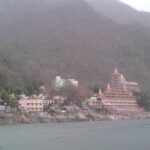Bhojpur Temple is nestled in the serene landscapes of Madhya Pradesh and is considered an architectural treat among the temples built during the reign of Raja Bhoj, several hundred years back in the 11th century. This is a temple dedicated to Lord Shiva. The incomplete structure of this temple is actually a part of its fame. The temple consists of ornately and elaborately carved pillars, imposing sculptures, and a huge Shivalingam said to be one of the largest in India.
Bhojpur Temple Location
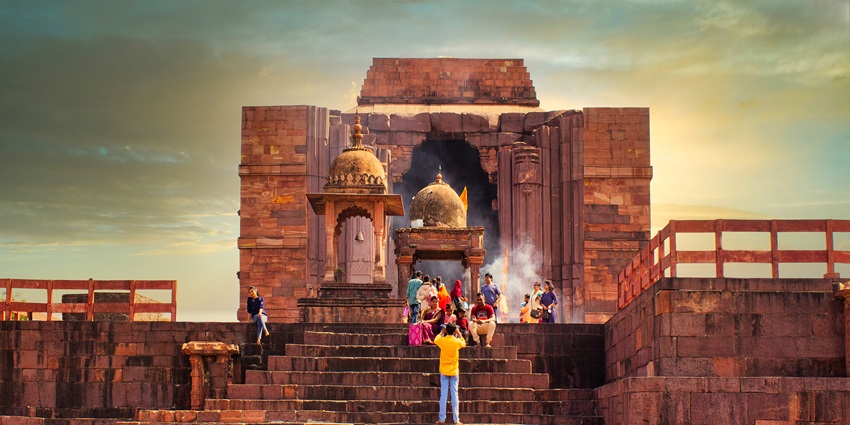
Photo: Madhya Pradesh Tourism / Wikimedia Commons
Bhojpur Temple is located in a small village called Bhojpur, which is at a distance of almost 28 km from Bhopal, the capital city of Madhya Pradesh. The temple has been built atop a hill-a spur-of the rocky and sandy ridge affording a very spirited view of the countryside around it.
Suggested Read: Forsyth Lodge Satpura National Park
How To Reach Bhojpur Temple
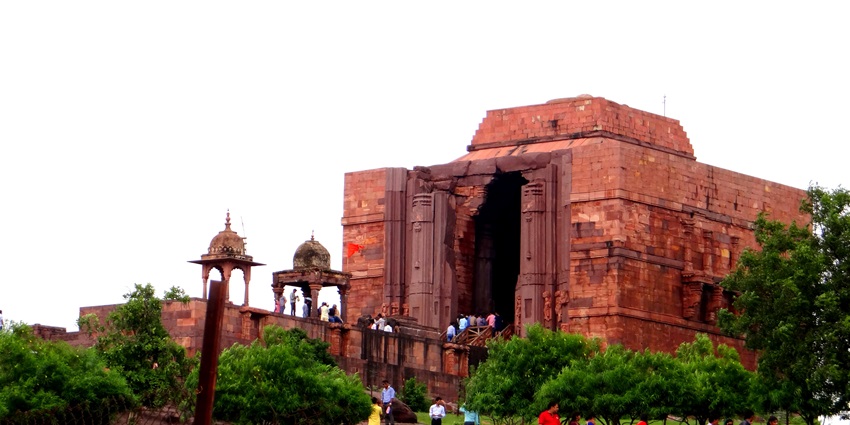
Photo: Shivanjan choudhury / Wikimedia Commons
By Air: The closest airport to the temple is situated in Bhopal, and it bears the name Raja Bhoj International Airport. The distance between the airport and the temple is about 30 km. A taxi can be hired from the airport or you can board a local bus to reach here.
By Bus: Bhojpur has good connectivity with frequent bus services available from Bhopal and other nearby cities. Several buses ply from Bhopal Bus Stand to Bhojpur quite frequently and therefore are rather convenient for visitors. From the Bhojpur village bus stop, one can easily hire a local auto-rickshaw or a taxi to reach the temple.
By Rail: The closest railway station is Bhopal Junction Railway Station, approximately 30 km from this temple. You can hire a taxi or board a local bus from here to Bhojpur Temple.
Places To Visit In And Around Bhojpur Temple
Here is a list of four places that are a must-visit when you are visiting Bhojpur Temple Madhya Pradesh.
1. Parvati Cave
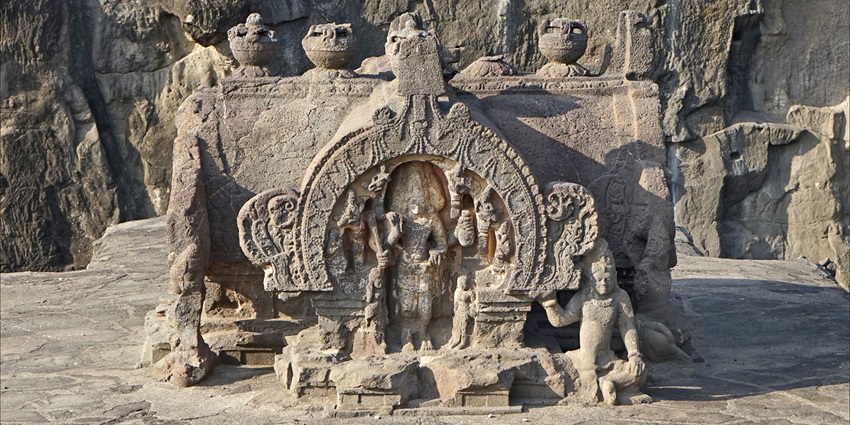
Photo: Jean-Pierre Dalbéra / Wikimedia Commons / Image For Representation Only
Parvati Cave, located around 30 km from the temple, is a small but spiritually significant site associated with Hindu mythology. This ancient cave, dedicated to Goddess Parvati, offers a quiet retreat for pilgrims and those interested in exploring lesser-known religious spots. The cave is modest in size but rich in history, with intricate carvings and a peaceful atmosphere that invites introspection and meditation. Surrounded by natural beauty, Parvati Cave is also ideal for short treks and nature walks, making it a great spot for both spiritual seekers and adventure enthusiasts.
Timings: Open all day
Entry Fee: Free
Suggested Read: Explore Dinosaur Fossil National Park
2. Bhojtal Lake
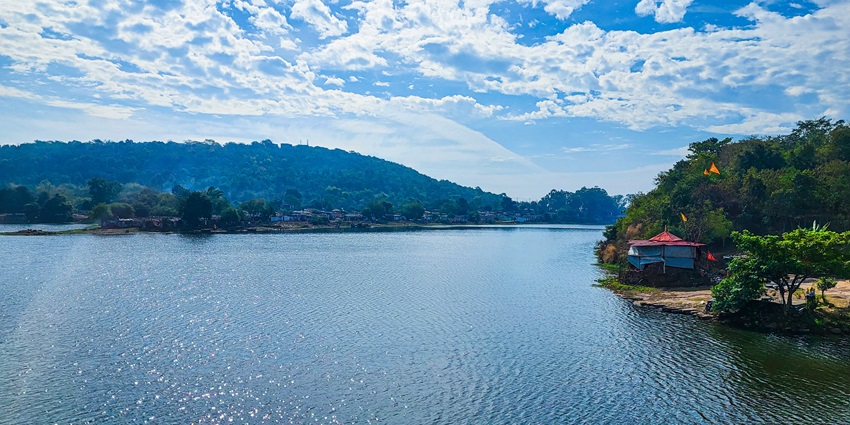
Photo: Shashank Shukla Kotaha / Shutterstock
Only a kilometre from the temple, Bhojtal Lake is an artificial yet stunningly beautiful lake. The tranquil environs of this lake are far away from the hustling bustle of city life. This serene lake is a good spot for picnics, nature walks, and leisure time. Adding to the beauty of this area are the lush landscapes surrounding the lake, making it a perfect photography and leisure station. Visitors can achieve all this by boating through the fantastic views of the temple and hillsides arising from here.
Timings: Open all day
Entry Fee: Free
3. Sanchi Stupa
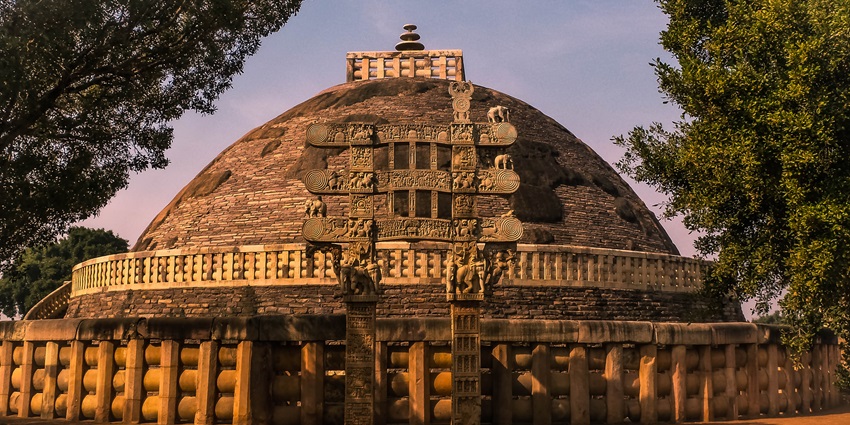
Photo: Achi28 / Wikimedia Commons
Sanchi Stupa is one of the most famous UNESCO World Heritage Sites, which boasts of some of the most ancient Buddhist stupas and monuments. Sanchi traces its history to the 3rd century BCE, with well-preserved stupas, gateways, and monolithic pillars that are excellent examples of ancient Indian architecture. Visitors can explore the impressive structures, admire intricate carvings, and learn about the historical significance of the site. Besides being highly spiritually acknowledged, Sanchi holds a gold mine of history; therefore, it is the most recommended site for people interested in Buddhism and Indian culture.
Timings: 8 AM – 6 PM
Entry Fee: ₹30 for Indians, ₹500 for foreign nationals
Suggested Read: Gandhi Sagar Wildlife Sanctuary
4. Bhimbetka Rock Shelters
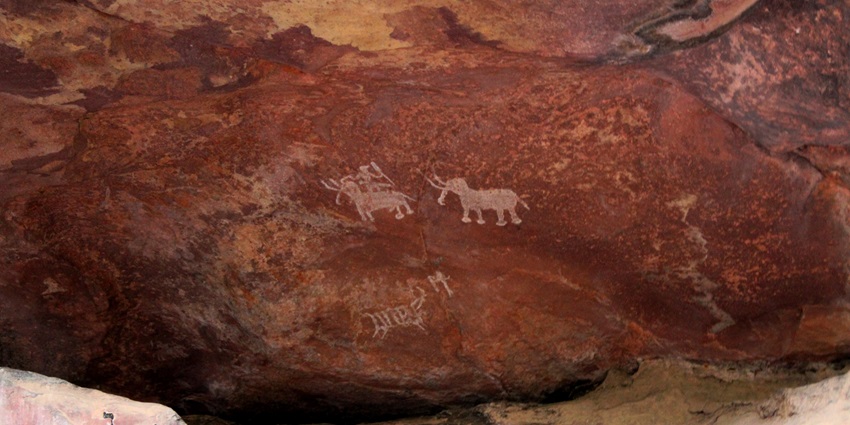
Photo: Varada Phadkay / Wikimedia Commons
These Bhimbetka Rock Shelters represent a UNESCO World Heritage Site, famous for their prehistoric Rock Paintings, located about 45 kilometres from Bhojpur. The ancient shelters contain paintings dating over 10,000 years, depicting scenes of early man’s life, animals, and rituals. With such amazing natural formations and historical importance, the site offers an interesting destination for both history buffs and nature lovers alike. It consists of several rock shelters that welcome visitors to explore their every nook and corner, displaying elaborate artwork and explaining the archaeological importance of this site.
Timings: 7 AM – 7 PM
Entry Fee: ₹25 for Indians, ₹200 for foreign nationals
Where To Stay
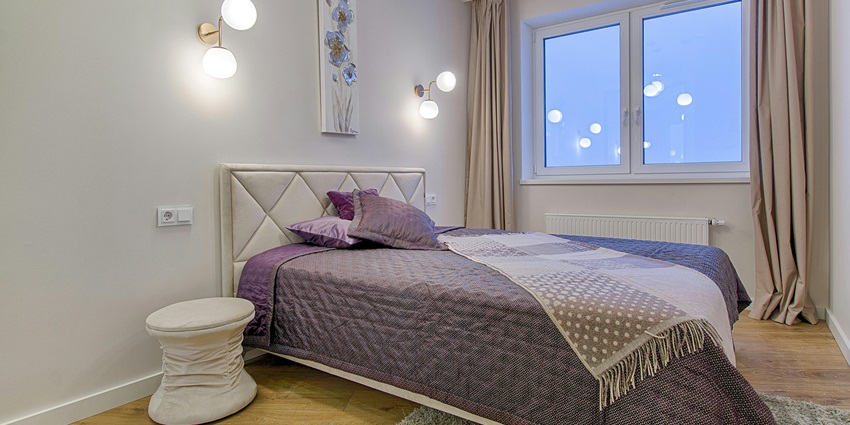
Photo: Vecislavas Popa / Pexels / Image For Representation Only
Popular choices include the MPT Pachmarhi and the Hotel Lakeview, which provide comfortable rooms and easy access to local attractions. For a more rustic experience, consider staying at eco-lodges or campsites near the temple that offer a blend of comfort and nature. These accommodations provide a convenient base for exploring the temple and surrounding areas, ensuring a pleasant stay while immersing yourself in the beauty of Madhya Pradesh’s natural landscape.
Suggested Read: National Parks Near Indore
Where To Eat
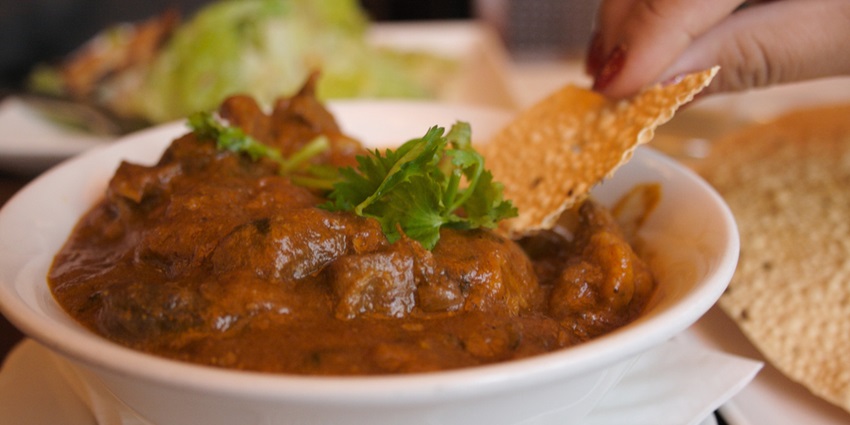
Photo: Gahdjun / Wikimedia Commons / Image For Representation Only
Local dhabas and eateries offer traditional Madhya Pradesh dishes, such as poha, dal bafla, and rogan josh, providing an authentic culinary experience. For a more casual dining atmosphere, consider restaurants like the River View Restaurant and the Hotel Patliputra, which serve Indian and continental cuisine. Many accommodations also feature in-house dining options for added convenience.
Best Time To Visit Bhojpur Temple
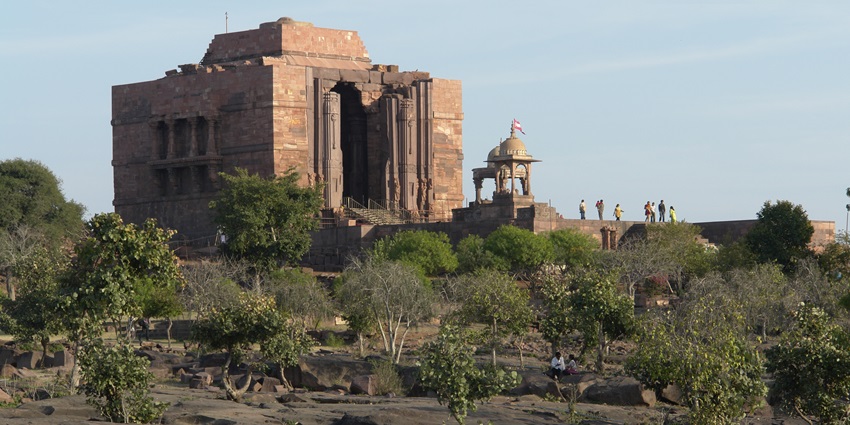
Photo: Yann / Wikimedia Commons
The best time to visit Bhojpur Temple is during the winter months, from October to March. The weather during this period is pleasant, with temperatures ranging from 15°C to 25°C (59°F to 77°F), making it ideal for exploring outdoor attractions. The cooler temperatures enhance the experience of visiting the temple and nearby sites. Avoiding the scorching summer months, when temperatures can exceed 40°C (104°F), makes for a more comfortable visit. Additionally, the post-monsoon season brings lush greenery, adding to the beauty of the temple and its surroundings, making it an excellent time for photography and exploration.
Suggested Read: Places To Visit In Dewas
Other Factors To Consider
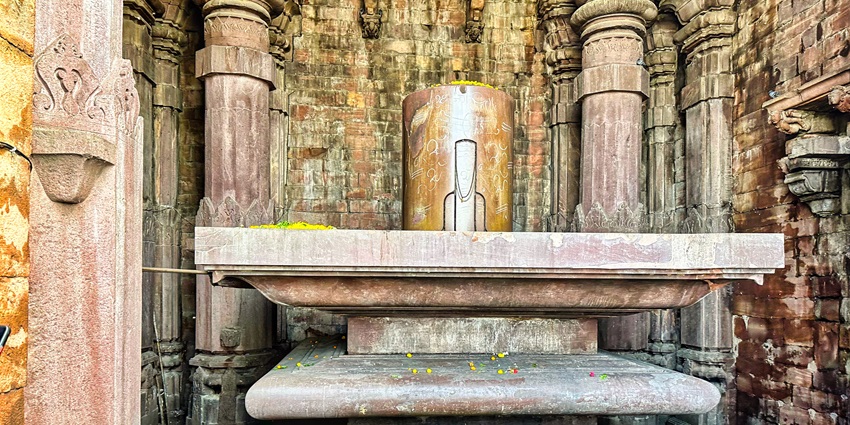
Photo: Ms Sarah Welch / Wikimedia Commons
Average Cost Of The Trip
The average cost of the trip can vary depending on your preferences and style of travel. For budget-conscious travellers, daily expenses can range between ₹1,500 and ₹2,500, covering basic accommodations, food at local eateries, and transportation. Those seeking a mid-range experience should expect to spend between ₹2,500 and ₹5,000 per day, which includes comfortable stays in mid-range hotels, dining at moderately priced restaurants, and convenient transportation options like taxis or private vehicles.
Tips For Travellers
- Dress Comfortably: Wear breathable, comfortable clothing suitable for walking and exploring.
- Stay Hydrated: Carry water bottles to stay hydrated while touring the temple and its surroundings.
- Respect Local Customs: Be mindful of cultural norms, especially when visiting sacred sites. Dress modestly and behave respectfully.
- Photography: Photography is allowed, so don’t forget to capture Bhojpur Temple photos.
- Explore Local Markets: Take some time to explore nearby markets for local handicrafts and souvenirs, adding a memorable touch to your trip.
Bhojpur Temple is not only a testament to the rich history and architectural prowess of ancient India but also a serene destination for spiritual seekers and nature lovers alike. The temple’s stunning surroundings and tranquil atmosphere make it a perfect spot for reflection and exploration. Book your journey with TripXL today and immerse yourself in the captivating charm of Madhya Pradesh’s remarkable landscape!
Cover Photo: Yann / Wikimedia Commons


 WhatsApp
WhatsApp
 Twitter
Twitter


